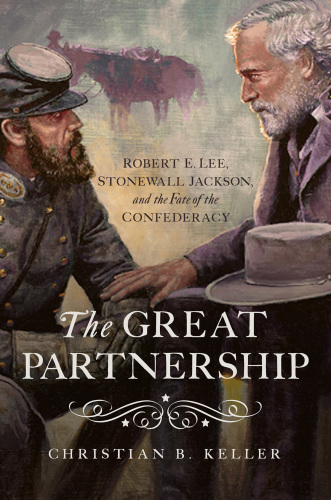
The Great Partnership
کتاب های مرتبط
- اطلاعات
- نقد و بررسی
- دیدگاه کاربران
نقد و بررسی

June 21, 2019
The death of Confederate Gen. Thomas "Stonewall" Jackson in May 1863 deprived Gen. Robert E. Lee of a valued friend. It also shattered any hope the South had of winning the U.S. Civil War. In his new book, Keller (history, U.S. Army War Coll., PA; Chancellorsville and the Germans) turns a fresh eye to the partnership of Lee and Jackson, arguing that modern military and business leaders can learn from their example, since it is at the highest levels that the ideas and strategies that win wars and save corporations are born. Keller identifies several reasons for their successful partnership. Their friendship, rooted in trust, was also underpinned by a shared religious faith. Lee and Jackson had a common vision for Confederate military strategy, namely to take an offensive war north into Maryland and Pennsylvania. Jackson's death broke this strategic relationship, which had dire implications for the Confederacy and its future. Making use of letters, diaries, and memoirs, many well-known to experts, Keller adds a new and important dimension to the historiography surrounding Lee and Jackson. VERDICT Readers interested in the American Civil War and its leaders will find much to enjoy in this fresh, new interpretation.--Chad E. Statler, Westlake Porter P.L., Westlake, OH
Copyright 2019 Library Journal, LLC Used with permission.

June 1, 2019
A study of the working relationship between Confederate generals Robert E. Lee and Stonewall Jackson, masters of strategy. "His equal can never be found for fighting; for planning, Genl Lee stands unsurpassed; for both, I place Genl Jackson at the head of any list." So noted a Virginia cavalryman in his diary after Jackson died as a result of wounds suffered under "friendly fire." The Army of Northern Virginia consistently fought against the odds, almost always outnumbered and outgunned by Union forces. Even so, thanks to strategic innovation and a certain derring-do--to say nothing of a willingness to expend lives for their cause--that force's chief generals managed to outfight their opponents. Jackson and Lee, writes Keller (History/United States Army War Coll.; Chancellorsville and the Germans, 2010, etc.), were friends who relied on each other for advice and leadership, Jackson taking the role of the chief strategic adviser who executed Lee's orders even when he disagreed with them. (In this respect, Jackson was much different from James Longstreet, who, Keller notes, always believed that his own strategic ideas were best and sulked when Lee overrode them.) Jackson had no shortage of ideas and plans, even venturing policy suggestions that led to such things as the "first national draft in American history." Together, Lee and Jackson developed early plans that would take the war north to such battlefields as Gettysburg, a battle that might have turned out much differently had Jackson not died in 1863. With Jackson's death, a partnership of near equals ended, and Lee reorganized his army while facing what Keller considers a thorny dilemma: "how to 'build' another Jackson-type subordinate in [Richard] Ewell and [A.P.] Hill within an extremely time-constrained and pressure-filled environment." He could not, and even though the Army of Northern Virginia managed to fight on until 1865, Jackson's loss was a critical turning point. Students of strategy and tactics, as well as of the Civil War, will find this a useful look at a storied partnership.
COPYRIGHT(2019) Kirkus Reviews, ALL RIGHTS RESERVED.

























دیدگاه کاربران